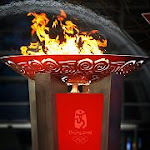
Just in case there was ant doubt that the Olypics will be non stop street theater, the IOC begs no politics. At the Olympics? With Gold Medals by country? Yikes!
Olympic Committee Tells Athletes
To Avoid Political Statements
By MEI FONG
May 7, 2008; Page A15
BEIJING -- To Olympic athletes contemplating wearing messages of support for Tibet, Darfur or even the notion of a better world, the International Olympic Committee is saying, "Don't."
Last week, the IOC sent a letter to all national Olympic organizing committees saying athletes should stay away from clothes, gestures or moves that demonstrate "political, religious or racial propaganda" at venues for the Beijing Games. This includes "all actions, reactions, attitudes" by people, including "external appearance, clothing, gestures and written or oral statements."
The letter appears to represent the IOC's most explicit statements to date clarifying an existing prohibition on the use of the Olympic Games as a political venue, and it is a bid to prevent protests from swamping what already has become one of the most contentious Games in recent history.
Recent demonstrations over China's human-rights record in Paris, London and San Francisco during the Olympic torch relay have in turn fanned a wave of patriotism and anti-Western sentiment in China.
IOC spokeswoman Giselle Davies said the letter, earlier reported by the Associated Press, makes it clear the IOC won't allow requests by, for instance, French athletes to wear a badge marked "For a better world," an attempt by the French contingent to express its disquiet in a way that wouldn't offend its Chinese hosts.
"We're not saying athletes can't express their views, but not at Games venues. The Olympics are about celebrating sporting achievements," she said. Athletes would be free to express their opinions outside Olympic venues, including in blogs, but must abide by local laws, she said.
Under Chinese law, protesters must apply for permits, a practice that frequently isn't followed. Chinese officials have said that visitors to the Olympics must observe Chinese law.
U.S. sprinters Tommie Smith, center, and John Carlos raised gloved fists in racial protest as the Star Spangled Banner was played at the 1968 Olympics.
Activist groups that have called on athletes to express their views through clothing include Team Darfur, a Washington-based coalition of athletes, and a Danish group called the Color Orange, which is encouraging Olympic participants to wear orange to protest human-rights violations in China. "How can they ban a color? They look like fools," said Color Orange's founder, Jens Galschiot. He was denied entry into Hong Kong last week, when the Olympic torch relay was being held there.
The Olympic prohibitions also might be challenged by patriotic Chinese wearing gear with a message professing love for China. Sales of such items have soared in recent weeks, as Chinese reacted with fury to outside criticism and perceived bias by Western media companies -- some of whom are underwriting the Games' running costs.
Past Olympians punished for making political gestures include American sprinters Tommie Smith and John Carlos, who protested racial inequality by raising black-gloved fists during the 1968 Summer Games in Mexico City. Both were suspended from the U.S. team.
Another was Korean marathoner Sohn Kee-Chung, who in 1936 became the first Korean to win an Olympic medal. An ardent patriot, Mr. Sohn publicly lamented competing under Japan's flag -- Korea was at the time a de facto Japanese colony -- and openly wept when it was hoisted during his medal presentation at the 1936 Summer Games in Berlin. Japanese authorities then banned him from competing in other running events, according to historian David Clay Large in the book "Nazi Games: The Olympics of 1936."
Separately, China acknowledged for the first time that it is tightening its visa policy ahead of the Olympic Games. Foreign-ministry spokesman Qin Gang told a regular media briefing Tuesday that "we are more strict and more serious" in approving visas.
For weeks, travel agents and foreign businesspeople have complained of extra difficulties in obtaining business or tourism visas to China. Mr. Qin said the tighter measures were to be maintained indefinitely, to create "a safe environment" and ensure "all the foreign friends who come to China can feel safer and happier."
--Andrew Batson contributed to this article.
Write to Mei Fong at mei.fong@wsj.com


No comments:
Post a Comment